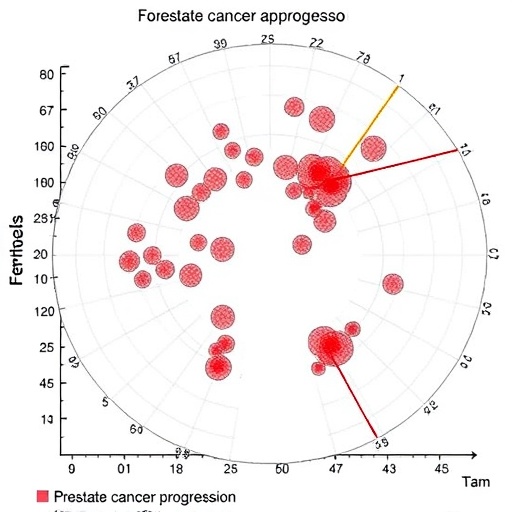Recent advancements in cancer research are propelling the fight against hormone-sensitive prostate cancer, a disease that affects millions worldwide. A groundbreaking study conducted by Lu, Pan, Yao, and their colleagues promises to revolutionize the way this particular cancer is understood and managed. By integrating a wide range of data modalities, the researchers aim to predict the progression of prostate cancer more accurately than ever before, thus enhancing treatment strategies and patient outcomes.
The significance of integrating multimodal data cannot be overstated in the context of cancer research. Traditionally, physicians have relied heavily on individual data sources—whether clinical, genomic, or imaging data—to make decisions regarding diagnosis and treatment. However, prostate cancer is complex, and its progression can be influenced by a multitude of factors. By combining data from various sources, the researchers are able to create a holistic view of the patient’s condition, ultimately leading to more personalized and effective treatments.
The study’s researchers employed advanced computational techniques to analyze the multimodal data gathered from patients with hormone-sensitive prostate cancer. These techniques included machine learning algorithms that can sift through vast quantities of data to identify patterns and predictors of disease progression. By training their models on existing patient data, the researchers were able to develop predictive frameworks that hold great promise for clinical applications.
One of the critical aspects of this research was the incorporation of genomic data, which has become increasingly vital in cancer treatment. Genomic studies have provided immense insight into the mutations and biological pathways involved in prostate cancer. The researchers specifically focused on key mutations that may act as markers for disease progression, allowing them to assess which patients are at higher risk for aggressive disease forms. This data’s integration with clinical markers such as prostate-specific antigen (PSA) levels allowed for a comprehensive risk assessment model.
Imaging data also played a significant role in the researchers’ efforts. Advanced imaging techniques offer crucial information about tumor size, shape, and metabolic activity. By analyzing these parameters alongside genomic and clinical data, the team was able to refine their predictive models. This integration of imaging data is crucial as it not only helps in assessing the current state of the cancer but also in forecasting its future behavior.
In addition to genomic and imaging data, the use of patient-reported outcomes adds a novel dimension to this research. Understanding how patients perceive their symptoms and quality of life can provide insights that purely clinical data may overlook. By integrating this qualitative data with quantitative measures, the researchers are working towards a more nuanced approach to understanding disease progression.
The implications of these findings extend far beyond academic discovery. In clinical practice, the integration of multimodal data could shift the paradigm from a one-size-fits-all approach to a more tailored strategy for patient management. Personalized treatment plans that consider an individual’s unique genomic makeup, clinical indicators, and even subjective experiences may yield significantly better outcomes and enhance the overall quality of care for prostate cancer patients.
Moreover, this approach is particularly timely in light of the increasing prevalence of hormone-sensitive prostate cancer globally. As the need for effective treatments grows, so does the need for innovative strategies that can adapt to the complexities of individual patient cases. This research stands to pave the way for future studies, encouraging other researchers to explore similar routes of data integration in their work.
As these predictive models evolve, regulatory bodies and healthcare professionals must be prepared for their potential clinical adoption. The transition from research findings to clinical practice involves rigorous validation phases and a re-evaluation of treatment protocols. Nonetheless, the promise encapsulated in this study opens doors to the possibility of a future where hormone-sensitive prostate cancer is managed with unprecedented precision.
The collaborative effort behind this research also highlights the importance of interdisciplinary teamwork in modern science. By bringing together experts in genomic medicine, computational biology, and clinical oncology, the study illustrates how collaborative approaches can accelerate advancements in cancer treatment. It signals a shift towards more integrated methodologies in tackling complex diseases, which could have far-reaching consequences for other areas of medicine as well.
In summary, the integration of multimodal data in predicting hormone-sensitive prostate cancer progression represents a significant leap forward in oncological research. As the study suggests, there is potential not only to enhance the understanding of individual patient trajectories but also to transform the standard of care for prostate cancer. With ongoing research and validation, the hope remains that data-driven advances can improve survival rates and ultimately provide patients with better quality of life.
The study emphasizes the need for continuous innovation in cancer research and treatment methodologies, signaling a future where data integration is paramount. As the scientific community eagerly awaits the outcomes of further investigations, the implications of this research may very well define the next generation of prostate cancer therapies.
In conclusion, Lu et al.’s work highlights a paradigm shift in the way clinicians and researchers can leverage multimodal data to address an urgently growing health concern. By harnessing technological advancements and methodological innovation, the dream of individualized cancer care is becoming a tangible reality. This study not only lays the groundwork for new therapeutic strategies but also contributes to a broader understanding of the intricate tapestry that is cancer biology. The road ahead promises to be as challenging as it is exciting, with the prospect of improved patient outcomes at its heart.
Subject of Research: Integrating multimodal data to predict the progression of hormone-sensitive prostate cancer.
Article Title: Integrating multimodal data to predict the progression of hormone-sensitive prostate cancer.
Article References:
Lu, X., Pan, C., Yao, L. et al. Integrating multimodal data to predict the progression of hormone-sensitive prostate cancer.
Clin Proteom 22, 21 (2025). https://doi.org/10.1186/s12014-025-09543-7
Image Credits: AI Generated
DOI: 10.1186/s12014-025-09543-7
Keywords: hormone-sensitive prostate cancer, multimodal data, predictive modeling, genomics, cancer treatment, personalized medicine, interdisciplinary research.




